
Influencers made millions pushing ‘wild’ births – now the Free Birth Society is linked to baby deaths around the world
22.11.2025 17:50 — 👍 139 🔁 37 💬 18 📌 16@drmorganalw.bsky.social
Lecturer in Social, Political, & Feminist Psychology at the University of Exeter. Studies social change, collective action, feminism, gender equality, violence against women, and reactionary social movements. Book worm & Halloween enthusiast✊🏻🍉🟰📚🎃

Influencers made millions pushing ‘wild’ births – now the Free Birth Society is linked to baby deaths around the world
22.11.2025 17:50 — 👍 139 🔁 37 💬 18 📌 16
Our new paper analyzes 19 predictors of climate change beliefs & action across 55 countries (N=4635)
4 predictors had consistent effects across all outcomes:
1) environmentalist identity,
2) trust in climate science,
3) internal environmental motivation,
4) the Human Development Index
Thank you so much, Linda! It was a pleasure working with you on this project. Thank you for support and mentorship (and patience while I finish our other R&R 😂).
07.02.2025 14:54 — 👍 2 🔁 0 💬 0 📌 0Thank you, Sofia!!
06.02.2025 20:09 — 👍 3 🔁 0 💬 0 📌 0Thank you so much, Mark! We really appreciate your support of this work - it was a labour of love, and I hope other folks find it interesting/useful, too!
06.02.2025 20:00 — 👍 6 🔁 0 💬 2 📌 0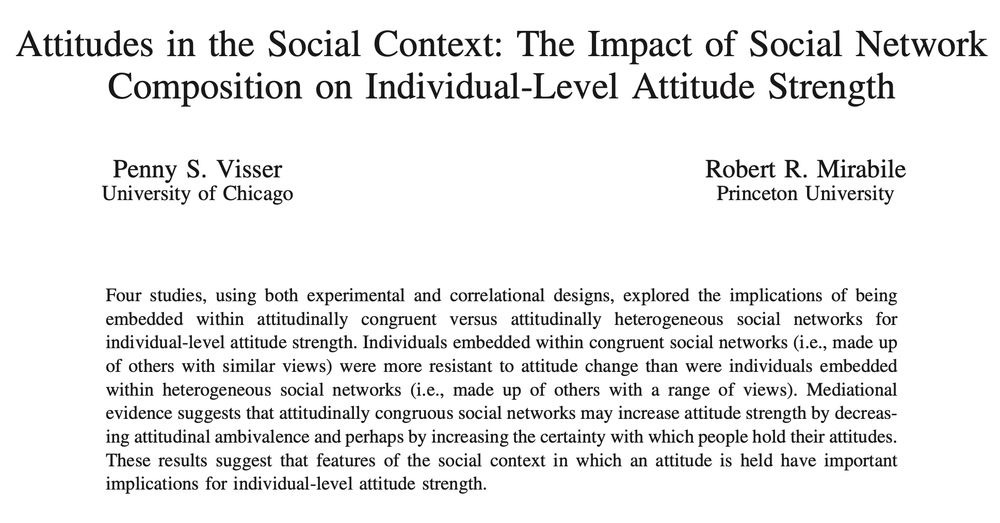
Paper titled, "Attitudes in the Social Context: The Impact of Social Network Composition on Individual-Level Attitude Strength". The abstract reads "Four studies, using both experimental and correlational designs, explored the implications of being embedded within attitudinally congruent versus attitudinally heterogeneous social networks for individual-level attitude strength. Individuals embedded within congruent social networks (i.e., made up of others with similar views) were more resistant to attitude change than were individuals embedded within heterogeneous social networks (i.e., made up of others with a range of views). Mediational evidence suggests that attitudinally congruous social networks may increase attitude strength by decreasing attitudinal ambivalence and perhaps by increasing the certainty with which people hold their attitudes. These results suggest that features of the social context in which an attitude is held have important implications for individual-level attitude strength."
People in social networks made up of others with similar views were more resistant to attitude change than people in heterogeneous social networks
pubmed.ncbi.nlm.nih.gov/15598106/

“Gatekeeping Science – How Methodological Critiques Police Feminist Research”
tidsskrift.dk/KKF/article/...
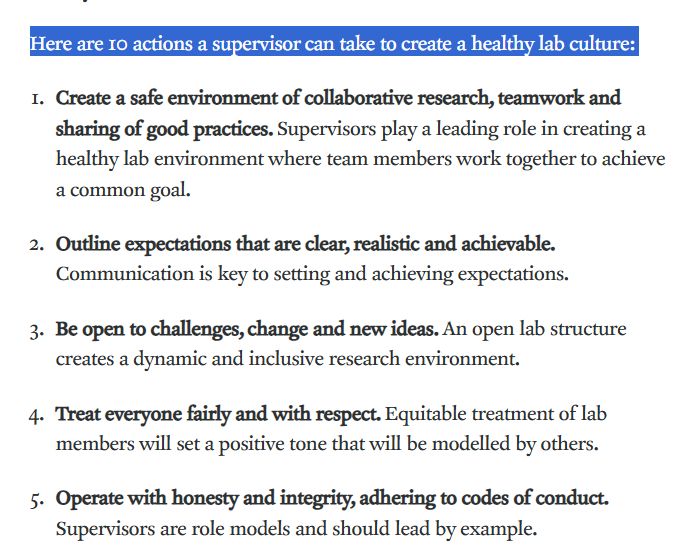
10 pointers for creating healthy lab culture.
These seem like low-bar suggestions that we can all strive toward.
These don't require money or resources. Just kindness & perspective-taking. And *genuinely* adopting a mentorship role.
universityaffairs.ca/career-advic...
#AcademicSky

Had a great day at the University of Exeter presenting some findings on social class and body image, followed by a lovely chat with folks at the Gender & Sexuality Research Collective. Even the sun made an appearance! ☀️
Thanks for organising @metesefauysal.bsky.social and @drmorganalw.bsky.social!
It was a pleasure, Jamie! Thanks for sharing your awesome work with us, and don’t be a stranger 😁
24.01.2025 14:59 — 👍 1 🔁 0 💬 0 📌 0
New paper in Men and Masculinities!
It analyzes how race and class inform how boys respond to #streetharassment awareness programs and how boys may fail to see harassment as ‘their’ problem (thus deflecting responsibility)
#GenderSky #masculinities
journals.sagepub.com/doi/full/10....

Cool study #PrejudiceResearch
Drafted into Vietnam service? White men expressed less anti-Black racism.
Authors attribute to #IntergroupContact
www.cambridge.org/core/journal...

Social Movements as Parsimonious Explanations for Implicit and Explicit Attitude Change
journals.sagepub.com/doi/full/10....
Was a pleasure to present my new post-doctoral work at #ASPO2024. I have been attending ASPO (Dutch social psych conference) since I was an eager Masters student, so grateful for this community. And thanks to my collaborator on this project, @dsquared.bsky.social, more to come!
16.12.2024 08:57 — 👍 12 🔁 1 💬 0 📌 0
Now published in the current issue of EJSP: "Never again: Lessons of genocide in survivor testimonies from the Holocaust, Nanjing massacre and Rwandan genocide" and available open access here: onlinelibrary.wiley.com/doi/full/10....
16.12.2024 14:52 — 👍 13 🔁 7 💬 0 📌 0New study suggests that perspective-taking reduces affective polarization & ingroup bias.
Empathic concern does not (& can make things worse)

We find that empathic concern correlates positively with inparty favoritism, while perspective-taking is positively correlated with liking the outparty more. Both concepts are part of the broader concept of empathy. Experimental results further support this idea. [2/5]
16.12.2024 12:45 — 👍 11 🔁 3 💬 1 📌 0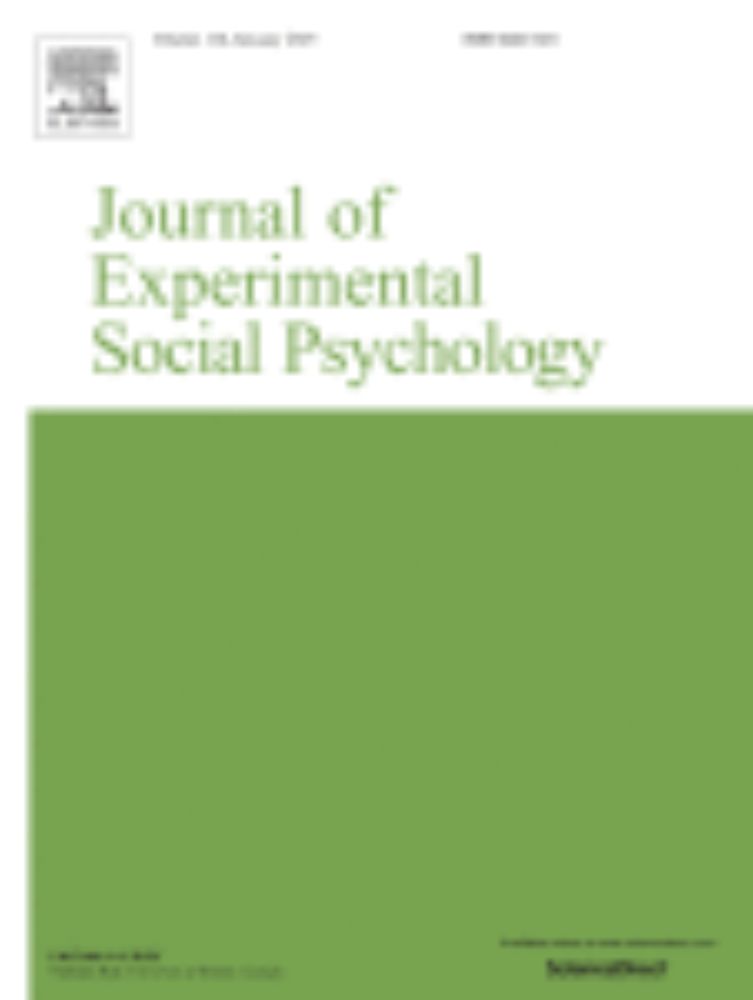
Social identity complexity is positively related to universal cooperation (& negatively related to parochialism)
Diverse identities allow people to assess situations from different perspectives, reducing bias & enhancing intergroup understanding + communication www.sciencedirect.com/science/arti...
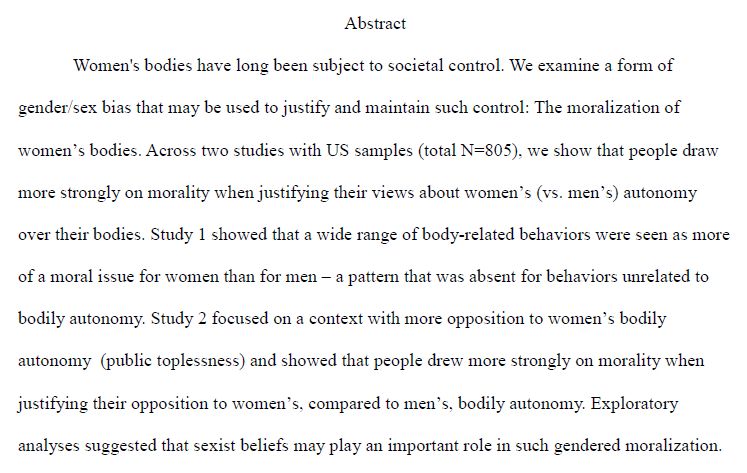
Excited that this work was just accepted at the European Journal of Social Psychology! "The Moralization of Women's Bodies." With the magical @shellkryan.bsky.social , Madisyn Arnold, and @nadirafaber.bsky.social.
06.12.2024 18:41 — 👍 39 🔁 10 💬 2 📌 3Researchers, this is super-useful. And if you set up an alert you'll get an email whenever the system finds new policy documents that mention your work
05.12.2024 20:18 — 👍 38 🔁 12 💬 0 📌 0
🍃Research: Doing more to protect the environment appears to increase a person's well-being. Reframing green actions as a path to happiness might help policymakers and environmental activists encourage environmental action. #EverydayPsych
🔗: ow.ly/9rUu50UlO9U

Super happy to host @yasemingacar.bsky.social @metesefauysal.bsky.social for a research talk today on climate activism and leadership
06.12.2024 12:10 — 👍 10 🔁 2 💬 0 📌 0
🤖 Ever wondered what determines #trust in #AI? We investigated the foundations of trust in an AI chatbot, testing an integrative model of trust from interpersonal trust research ➡️ Key results summarised below! #socialpsyc #trustresearch
Hot off the press JEP:General, with Anna-Marie Bertram ✨
This is nice! Well nice to me, if not nice to despair.
04.12.2024 16:39 — 👍 666 🔁 38 💬 12 📌 2
In light of popular accounts in the United States of “mansplaining,” we investigated the effects on women when others give them “unresponsive” advice (i.e., unsolicited, generic, and prescriptive recommendations). We show using both vignettes (Study 1) and live interactions (Study 2) that unresponsive advice (vs. responsive questions) from men negatively affected women’s self-perceptions, leaving them feeling less respected, powerful, and trusting and having a smaller size of self. The advice giver’s gender did not moderate these self-perception outcomes (Study 3), although women anticipated greater stereotype threat only when men, and not when women, gave them unresponsive advice. Similar effects were found using responsive advice instead of questions as the comparison condition (Study 4). Overall, these findings (N = 4,394 U.S. adult women) suggest that it is the unresponsive nature of advice—and for certain outcomes the advice giver’s gender—that explain its effects on women. They point to the value of a responsive suggestion or question during conversations, particularly during cross-gender ones.
Mansplaining
"What is clear is that instead of immediately responding with prescriptive and generic advice, asking a question or giving tailored, solicited advice can confer respect and reduce women’s stereotype threat."
Santoro & Markus (2024): doi.org/10.1177/0956...
#Psychology #SocialPsyc 🧪

Heroization promotes worse treatment of the very groups that it is meant to venerate
Attaching the "Hero" label to groups (like teachers, nurses, and military personnel) strengthens expectations that they will volunteer for their own exploitation psycnet.apa.org/record/2024-...
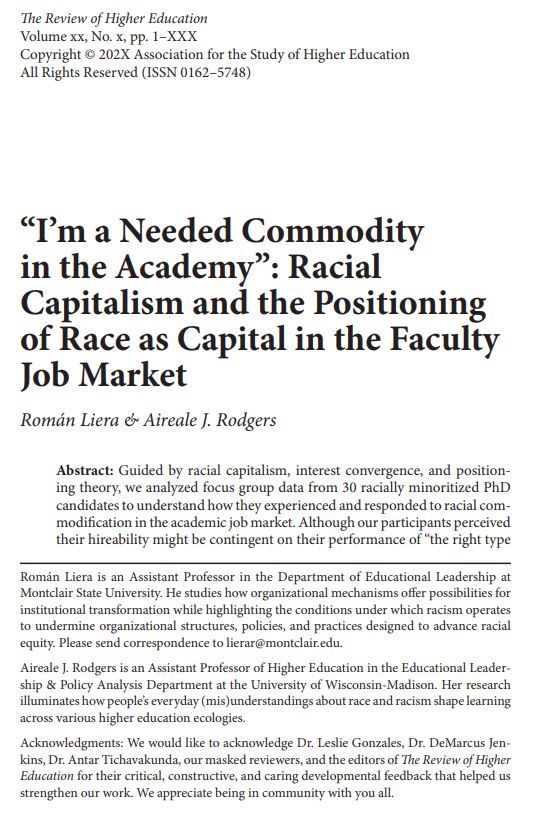
Screengrab of the PDF of our manuscript, “I’m a Needed Commodity in the Academy”: Racial Capitalism and the Positioning of Race as Capital in the Faculty Job Market
🚨 New Pub Alert 🚨
We surface how PhD Candidates of Color understood and responded to the commodification of their racial identities through both their socialization for the job market and their experiences applying for tenure track faculty jobs at HWIs. Check it out!
muse.jhu.edu/pub/1/articl...
Congratulations Charlie and Jolanda! Incredibly well-deserved my dear 🤩 🎉
29.11.2024 22:16 — 👍 1 🔁 0 💬 1 📌 0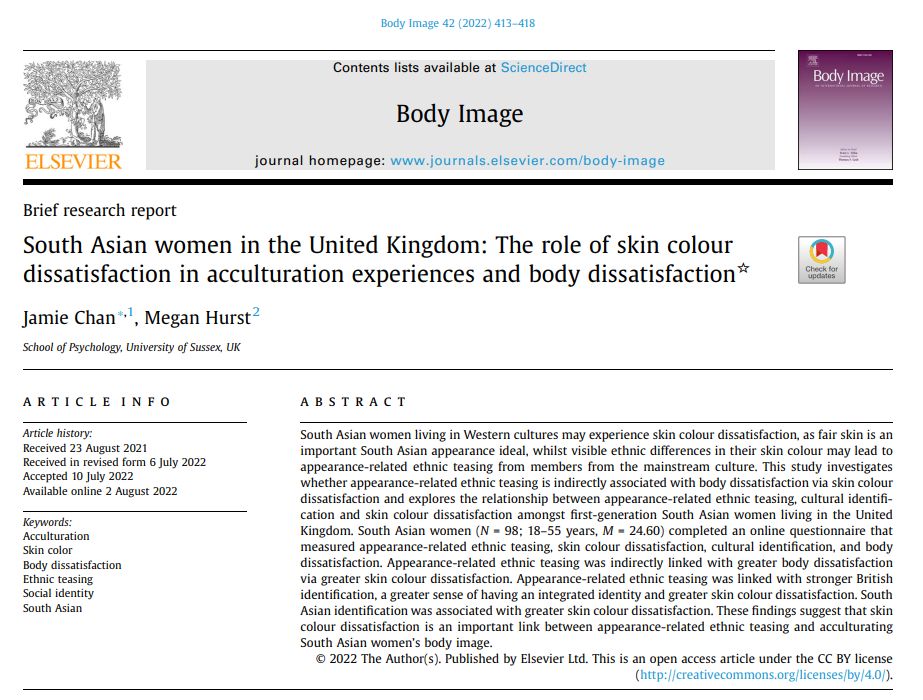
Next in my (re)introduction research drip-feed is my first ever publication (back in 2022 - how time flies!) on how appearance-related ethnic teasing is associated with skin colour dissatisfaction and body dissatisfaction for South Asian women in the UK.
doi.org/10.1016/j.bo... (it's open access!)

Great timing, Bluesky just announced searchable starter packs
blueskystarterpack.com
(I'd also check out @markrubin.bsky.social 's feed, especially but not only for Psych connections)